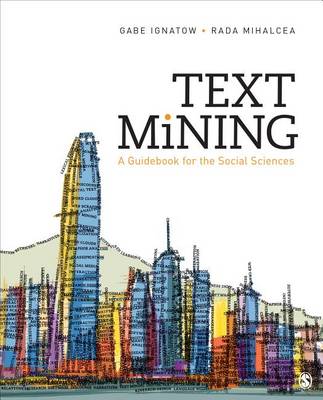
Stock image for illustration purposes only - book cover, edition or condition may vary.
Text Mining: A Guidebook for the Social Sciences
Gabe Ignatow
€ 125.66
FREE Delivery in Ireland
Description for Text Mining: A Guidebook for the Social Sciences
Paperback. This practical book provides researchers strategic and practical guidance on using text mining methods to analyze large text collections more efficiently and productively. Num Pages: 208 pages, illustrations. BIC Classification: JHBC. Category: (G) General (US: Trade). Dimension: 190 x 232 x 14. Weight in Grams: 360.
Online communities generate massive volumes of natural language data and the social sciences continue to learn how to best make use of this new information and the technology available for analyzing it. Text Mining: A Guidebook for the Social Sciences brings together a broad range of contemporary qualitative and quantitative methods to provide strategic and practical guidance on analyzing large text collections. This accessible book, written by sociologist Gabe Ignatow and computer scientist Rada Mihalcea, surveys the fast-changing landscape of data sources, programming languages, software packages, and methods of analysis available today. Suitable for novice and experienced researchers alike, the book will help readers use text mining techniques more efficiently and productively.
Product Details
Publisher
SAGE Publications Inc
Format
Paperback
Publication date
2016
Condition
New
Number of Pages
208
Place of Publication
Thousand Oaks, United States
ISBN
9781483369341
SKU
V9781483369341
Shipping Time
Usually ships in 15 to 20 working days
Ref
99-99
About Gabe Ignatow
Gabe Ignatow is Professor of Sociology and Director of Graduate Studies at the University of North Texas. His research interests are mainly in the areas of sociological theory, digital research methods, cognitive social science, and the philosophy of social science. His most recent books are Text Mining and An Introduction to Text Mining, both coauthored with Rada Mihalcea (University of Michigan). He is also a coeditor, with Wayne Brekhus (University of Missouri), of the Oxford Handbook of Cognitive Sociology. Rada Mihalcea is a professor of computer science and engineering at the University of Michigan. Her research interests are in computational linguistics, with a focus on lexical semantics, multilingual natural language processing, and computational social sciences. She serves or has served on the editorial boards of the following journals: Computational Linguistics, Language Resources and Evaluation, Natural Language Engineering, Research on Language and Computation, IEEE Transactions on Affective Computing, and Transactions of the Association for Computational Linguistics. She was a general chair for the Conference of the North American Chapter of the Association for Computational Linguistics (NAACL, 2015) and a program cochair for the Conference of the Association for Computational Linguistics (2011) and the Conference on Empirical Methods in Natural Language Processing (2009). She is the recipient of a National Science Foundation CAREER award (2008) and a Presidential Early Career Award for Scientists and Engineers (2009). In 2013, she was made an honorary citizen of her hometown of Cluj-Napoca, Romania.
Reviews for Text Mining: A Guidebook for the Social Sciences
This is a clear, comprehensive and thorough description of new text mining techniques and their applications: a must for students and social researchers who wish to understand how to tackle the challenges raised by Big Data.
Aude Bicquelet Text Mining and Analysis is a comprehensive book that deals with the latest developments of text mining research, methodology, and applications. An excellent choice for anyone who wants to learn how these emerging practices can benefit their own research in an era of Big Data.
Kenneth C. C. Yang
Aude Bicquelet Text Mining and Analysis is a comprehensive book that deals with the latest developments of text mining research, methodology, and applications. An excellent choice for anyone who wants to learn how these emerging practices can benefit their own research in an era of Big Data.
Kenneth C. C. Yang
